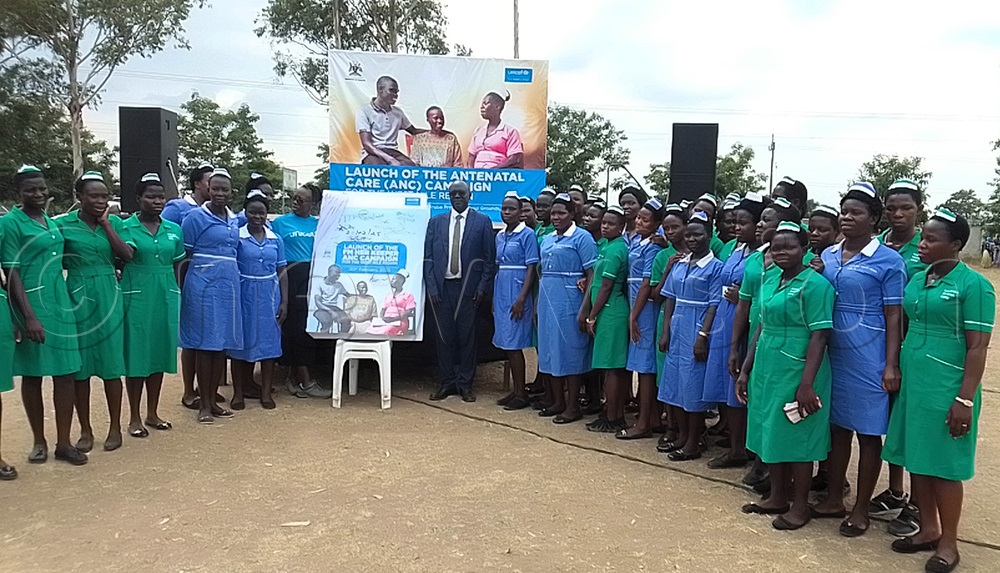Why pregnant Arua women hiring bodabodas as husbands
Eyimaru, a pregnant woman from Eruba parish in Arua district said pregnant women should not deliver at home but rather visit health facilities for better health care services.
Gladys Eyimaru, a pregnant mother in Eruba Parish in Arua District remarks. (Credit: Robert Ariaka)
By Robert Ariaka
Journalists @New Vision
ARUA - A section of women in Arua district are being forced to pay shilling 2,000 to hire male bodaboda riders to accompany them to health facilities to attend antenatal care visits.
This, according to Gladys Eyimaru, is a challenge faced by pregnant women whose men have shunned supporting their wives for antenatal care services.
From the initial four antenatal care visits, which are expected to be attended by husbands too, the health ministry has increased the visits to eight.
Speaking to New Vision Online on March 17, 2025, Eyimaru, a pregnant woman from Eruba parish in Arua district said pregnant women should not deliver at home but rather visit health facilities for better health care services.
She expressed disappointment over men who fail to play their duty and responsibility to go with their wives to the health centre for antenatal visits.
According to Eyimaru, this has forced some pregnant women to pay shillings 2,000 to bodaboda riders to escort them to health facilities and stand in as the man to have quick access to antenatal care.
Dr Ronald Miria Ocatre, the Assistant Commissioner in charge of health promotion and strategic health communication wearing a coat, with nurses in Arua District. (Credit: Robert Ariaka)
A dangerous opportunity
This practice has come with both positive and negative responses. The lucky women who find men safe from HIV return home with smiles after receiving various tests but the unlucky women encounter quarrels and attacks from bodaboda men who turn out to be HIV positive.
Eyimaru explained that such men end up accusing and blaming the women for hiring them yet they had no intention to undergo mandatory HIV testing and counselling.
She advised medical personnel to start writing messages to men to come with their wives to health facilities for antenatal care services.
Acting Arua district health officer Peace Oliver Eyotaru said when a woman gets pregnant, the couple is pregnant. This means that men become part of the pregnancy and should take responsibility for the various needs and demands of the pregnant mother.
She advised mothers to visit health facilities and avoid visiting traditional birth attendants.
"We are encouraging pregnant women to attend antenatal services for better medical care," she said.
A husband who comes with the wife is always given priority to health care services to encourage other men to pick an interest to accompany their wives.
Dr Eyotaru advised men to prepare for their babies and ensure the delicate mother and baby are well taken care of for safe delivery.
She advises technical officers to use good language to mobilise men to accompany their wives to the health facilities.
Victor Afayo, a gynaecologist and co-ordinator for Arua local maternity and newborn systems, said antenatal makes it easy to identify and deliver safely.
"The coverage for the first visit should be in the first three months and identify any challenges and address them at an early stage. We need the male partners to get involved at the early stages," he said.
According to Afayo, the support of men makes women feel happy and have a safe mental attitude but those who are abandoned develop mental challenges and bad moods affecting the health of the babies born.
Dr Ronald Miria Ocatre, the assistant commissioner in charge of health promotion and strategic health communication, said the campaign is geared at promoting antenatal visits in the first three months to help improve the mothers' health and control diseases that can affect the outcome of birth.
Diseases like HIV, Hepatitis B and syphilis, among others, can tremendously affect the pregnancy of mothers.
